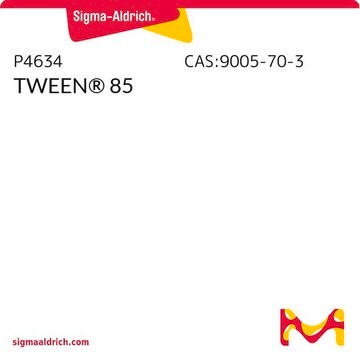P1754
TWEEN® 80
viscous liquid
Synonym(s):
TWEEN® 80, POE (20) sorbitan monooleate, Polyethylene glycol sorbitan monooleate, Polyoxyethylenesorbitan monooleate, Polysorbate 80
About This Item
Recommended Products
biological source
Porcine (tallow)
bovine (tallow)
Quality Level
description
non-ionic
form
viscous liquid
mol wt
micellar avg mol wt 79,000
average mol wt 1310
composition
Oleic acid, ≥58.0% (balance primarily linoleic, palmitic, and stearic acids)
aggregation number
60
CMC
0.012 mM (20-25°C)
viscosity
400-620 mPa.s
transition temp
cloud point 65 °C
solubility
water: soluble, clear to slightly hazy, colorless to yellow
density
1.064 g/cm3
HLB
15
application(s)
cell analysis
SMILES string
CCCCCCCC/C=C/CCCCCCCC(=O)OCCOCC(C1C(CC(O1)OCCO)OCCO)OCCO
InChI
1S/C32H60O10/c1-2-3-4-5-6-7-8-9-10-11-12-13-14-15-16-17-30(36)40-25-24-37-27-29(39-22-19-34)32-28(38-21-18-33)26-31(42-32)41-23-20-35/h9-10,28-29,31-35H,2-8,11-27H2,1H3/b10-9+
InChI key
RGPBUVUVZKQNHD-MDZDMXLPSA-N
Looking for similar products? Visit Product Comparison Guide
General description
Application
Biochem/physiol Actions
Features and Benefits
- Excellent wetting and dispersing agent
- Highly versatile surfactant for your Cell Biology and Biochemical research
Other Notes
Legal Information
comparable product
Storage Class
10 - Combustible liquids
wgk_germany
WGK 1
flash_point_f
>235.4 °F - closed cup
flash_point_c
> 113 °C - closed cup
ppe
Eyeshields, Gloves
Choose from one of the most recent versions:
Already Own This Product?
Find documentation for the products that you have recently purchased in the Document Library.
Customers Also Viewed
Our team of scientists has experience in all areas of research including Life Science, Material Science, Chemical Synthesis, Chromatography, Analytical and many others.
Contact Technical Service






